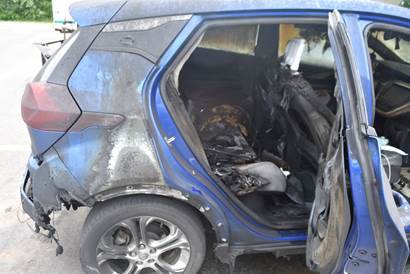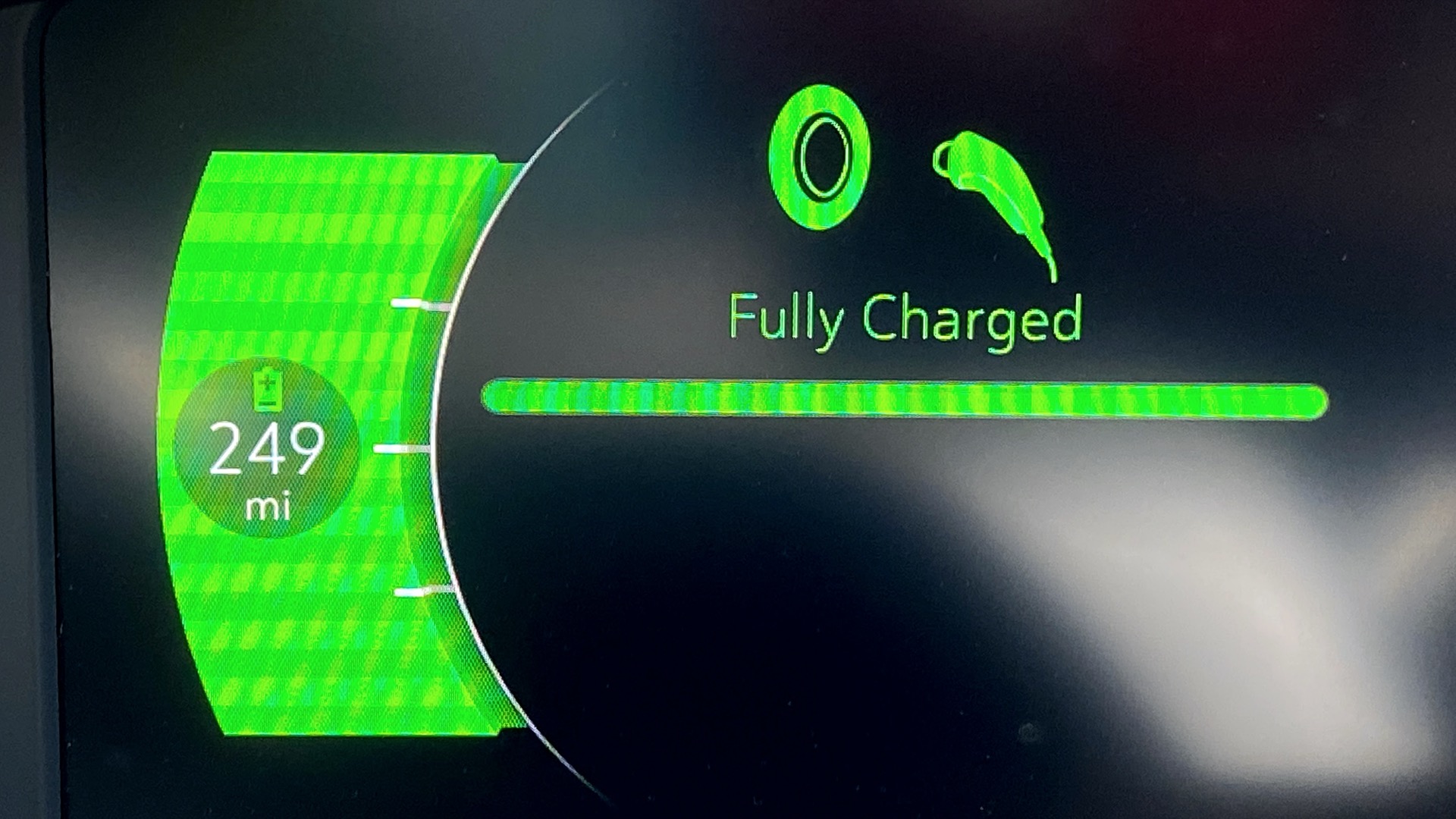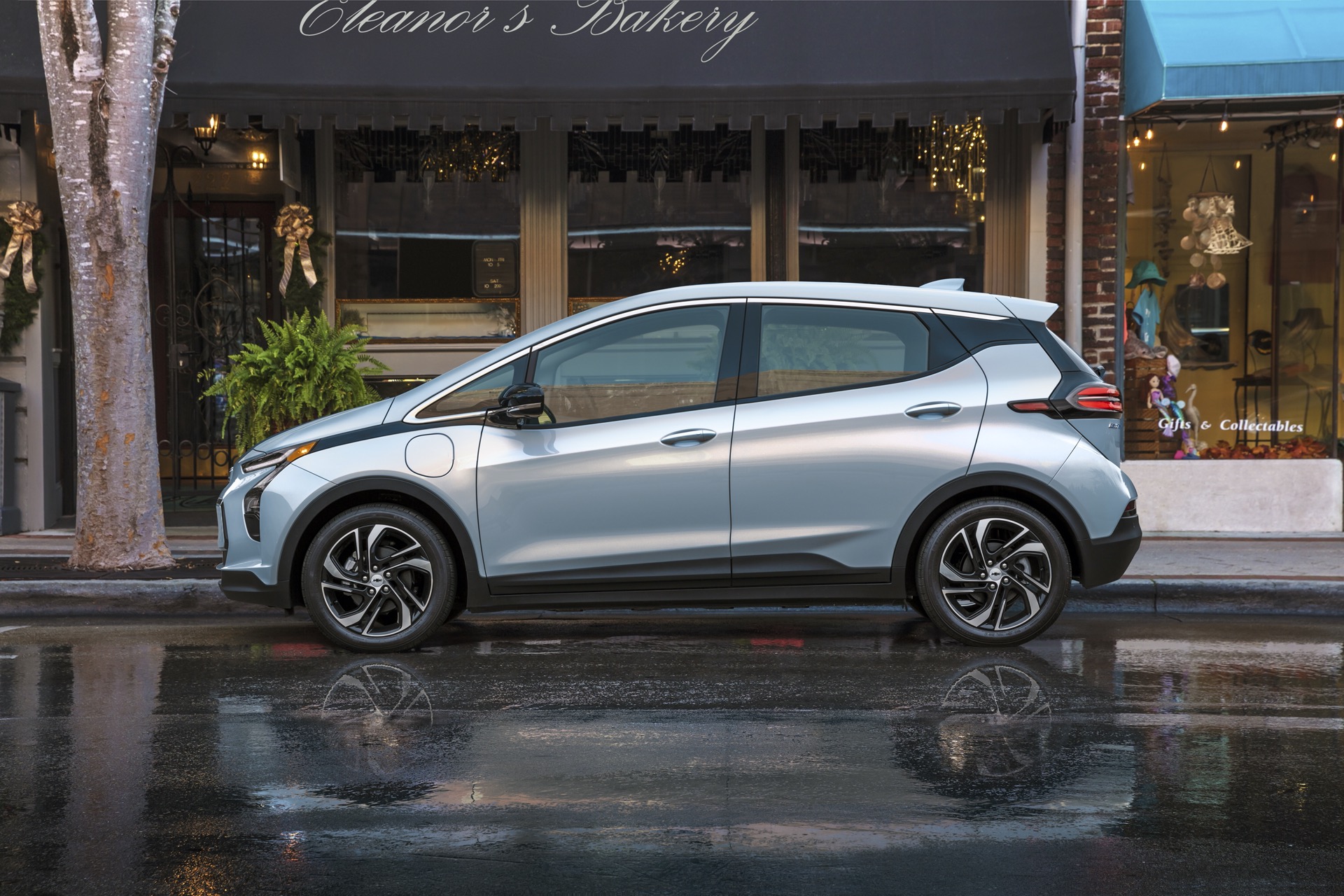By David Shepardson
WASHINGTON (Reuters) - General Motors Co said on Friday it would take a hit of $1 billion to expand the recall of its Chevrolet Bolt electric vehicles due to the risk of fires from the high-voltage battery pack - a blow for the largest U.S. automaker as it seeks to ramp up EV sales.

FILE PHOTO: A 2019 Chevrolet Bolt plug-in electric vehicle is displayed at the North American International Auto Show in Detroit, Michigan, U.S., January 15, 2019. REUTERS/Rebecca Cook
The Detroit company also said it would indefinitely halt sales of the EVs due to the issue and will seek reimbursement from battery supplier LG. The latest recall covers 73,000 vehicles from model years 2019 through 2022.
“The reserves and ratio of cost to the recall will be decided depending on the result of the joint investigation looking into the root cause, currently being held by GM, LG Electronics and LG Energy Solution,” LG said in a statement, referring to its subsidiaries.
LG added that it is actively working with its client and partners to ensure that the recall measures are carried out smoothly.
GM shares were down 2.2% in after-hours trade after dipping 0.6% during Friday’s regular session.
Earlier this month, South Korea’s LG Electronics Inc cut its second-quarter operating profit by more than a fifth to reflect costs for the GM recalls.
LG Electronics has supplied GM with battery modules made with cells produced by LG Chem’s wholly owned battery subsidiary LG Energy Solution (LGES).
Earlier this year, Hyundai Motor Co said it would spend $900 million to replace LG batteries in some 82,000 EVs due to fire risks.
On Friday, GM said the recall covers all remaining Bolt vehicles not previously recalled in July. GM said it will replace defective battery modules in Bolt EVs and EUVs with new modules. The $1 billion price tag for the latest recall comes on top of $800 million GM said previous Bolt recalls had cost.
GM and LGES have a joint venture, Ultium Cells LLC, that is building battery cell plants in Ohio and Tennessee, with plans to add two more after that. GM has said it will use a different-generation battery when it launches electric Hummer and Cadillac vehicles over the next year.
In July, GM issued a recall for nearly 69,000 Chevrolet Bolts for fire risks after reports of two fires and said it would replace defective battery modules as needed. Friday’s action expands the population of vehicles for the same issue.
NEW CONSUMER WARNING
GM, which said Bolt sales would cease until it was satisfied with the fix, said it is “working aggressively with LG to increase (battery module) production as soon as possible.” GM added it will notify customers when replacement parts are ready
Some Bolt EVs recalled in July were previously recalled last November to update software to address fire risks, but at least one fire occurred after the software update. GM said on Friday there had been a total of 10 Bolt fires.
The July recall came after GM and the National Highway Traffic Safety Administration (NHTSA) urged Bolt owners to park their vehicles outside and away from homes after charging. GM on Friday reiterated that owners of the newly recalled vehicles should park them outside after charging and not leave them charging indoors overnight.
On Friday, NHTSA issued a new consumer warning to Bolt owners about the issue and said it is still investigating.
The automaker said in rare circumstances, the batteries supplied to GM for these vehicles may have two manufacturing defects – a torn anode tab and folded separator – present in the same battery cell, which increases the risk of fire.
After the 10th fire in Chandler, Arizona, GM said it “discovered manufacturing defects in certain battery cells produced at LG manufacturing facilities beyond the Ochang, Korea, plant.”
The new recall includes 9,335 Bolt EVs from model year 2019 that were not included in the previous recall and 63,683 2020–2022 model year Chevrolet Bolt EVs and EUVs.
Reporting by David Shepardson in Washington; Additional reporting by Ben Klayman in Detroit and Heekyong Yang in Seoul; Editing by Sonya Hepinstall, Matthew Lewis and Aurora Ellis
GM expands battery-fire recall to Chevy Bolt EUV, every Bolt EV made
AUGUST 20, 2021 12 COMMENTS
General Motors has expanded the recall of Chevrolet Bolt EV models due to battery-related fire concerns—to include 2019-2021 Bolt EV models and new 2022 Bolt EV and EUV models.
GM just earlier this week confirmed that it planned to replace all battery modules on affected 2017-2019 Bolt EV models, subject to be adjusted after an additional investigation. It’s now expecting to do the same with the rest of the Bolt EV population, including models recently delivered and those in dealer inventories.
Both issues are related to the same two potential battery defects, stemming from reports of fires when Bolt EV vehicles had been plugged in and or recently charged to full. The Bolt EV and EUV models use cells made by LG Chem in South Korea through mid 2019, and then Holland, Michigan from mid-2019 on. GM had previously said that the so-called “design level N2.1” made in Michigan were unaffected; it hasn’t yet disclosed whether it’s aware of instances of fire with the newer cells.

Chevrolet Bolt EV fire - Vermont State Police
GM now recommends that until customers receive new battery modules, they should set their vehicle to a maximum 90 percent state of charge, charge their vehicle more frequently and not allow it below 70 miles of range, and park the vehicle outside immediately after charging. Reiterating a previous caution, GM warns against charging the vehicle inside the garage overnight.
Between the two recall efforts, GM could potentially be replacing all the battery modules—or full packs, as it may turn out—in more than 140,000 Bolt EVs in North America, of which more than 110,000 are in the U.S.

2020 Chevrolet Bolt EV review update - Portland OR
The previous recall effort for 2017-2019 models covered 68,667 Bolt EVs, including 50,925 in the U.S. The expanded recall adds 63,683 Bolt EVs from the 2020-2022 model year (52,403 in the U.S.), plus 9,335 Bolt EVs from the 2019 model year (6,989 in the U.S.) that weren’t covered by the previous effort.
The expanded recall would cost the company $1 billion more than what had been spent on previous Bolt recall efforts, and it stated today that it will seek reimbursement from LG Chem, the cell supplier.

2022 Chevrolet Bolt EV
GM and LG Chem are close business partners, with the companies’ Ultium Cells LLC joint venture set to supply GM electric vehicles through the decade and beyond, with a total of four battery factories in the works.
Customers are to contact 1-833-EVCHEVY or their dealership with questions, or check the Bolt EV recall page for more information.
General Motors has expanded the recall of Chevrolet Bolt EV models due to battery-related fire concerns—to include 2019-2021 Bolt EV models and new 2022 Bolt EV and EUV models.
GM just earlier this week confirmed that it planned to replace all battery modules on affected 2017-2019 Bolt EV models, subject to be adjusted after an additional investigation. It’s now expecting to do the same with the rest of the Bolt EV population, including models recently delivered and those in dealer inventories.
Both issues are related to the same two potential battery defects, stemming from reports of fires when Bolt EV vehicles had been plugged in and or recently charged to full. The Bolt EV and EUV models use cells made by LG Chem in South Korea through mid 2019, and then Holland, Michigan from mid-2019 on. GM had previously said that the so-called “design level N2.1” made in Michigan were unaffected; it hasn’t yet disclosed whether it’s aware of instances of fire with the newer cells.

Chevrolet Bolt EV fire - Vermont State Police
GM now recommends that until customers receive new battery modules, they should set their vehicle to a maximum 90 percent state of charge, charge their vehicle more frequently and not allow it below 70 miles of range, and park the vehicle outside immediately after charging. Reiterating a previous caution, GM warns against charging the vehicle inside the garage overnight.
Between the two recall efforts, GM could potentially be replacing all the battery modules—or full packs, as it may turn out—in more than 140,000 Bolt EVs in North America, of which more than 110,000 are in the U.S.

2020 Chevrolet Bolt EV review update - Portland OR
The previous recall effort for 2017-2019 models covered 68,667 Bolt EVs, including 50,925 in the U.S. The expanded recall adds 63,683 Bolt EVs from the 2020-2022 model year (52,403 in the U.S.), plus 9,335 Bolt EVs from the 2019 model year (6,989 in the U.S.) that weren’t covered by the previous effort.
The expanded recall would cost the company $1 billion more than what had been spent on previous Bolt recall efforts, and it stated today that it will seek reimbursement from LG Chem, the cell supplier.

2022 Chevrolet Bolt EV
GM and LG Chem are close business partners, with the companies’ Ultium Cells LLC joint venture set to supply GM electric vehicles through the decade and beyond, with a total of four battery factories in the works.
Customers are to contact 1-833-EVCHEVY or their dealership with questions, or check the Bolt EV recall page for more information.
GM expands battery recall to ALL 2017-2022 Chevy Bolt EVs including EUV, blames supplier LG
Seth Weintraub
- Aug. 20th 2021
@llsethj

GM Friday afternoon announced it would expand its Bolt recall to ALL Chevy Bolts including ones manufactured in the US and including the 2022 EV and EUVs. It looks like LG is being thrown under the bus here.
GM has changed its tone on the recall press releases, now putting the blame squarely on the battery supplier.
General Motors is voluntarily expanding the current Chevrolet Bolt EV recall to cover the remaining 2019 and all 2020-2022 model year vehicles, including the Bolt EUV. In rare circumstances, the batteries supplied to GM for these vehicles may have two manufacturing defects – a torn anode tab and folded separator – present in the same battery cell, which increases the risk of fire. Out of an abundance of caution, GM will replace defective battery modules in Chevrolet Bolt EVs and EUVs with new modules, with an expected additional cost of approximately $1 billion.
Just 5 days ago we noted that GM expanded the recall to fully replace all batteries in affected Chevy Bolts with batteries made in Korea, which happened until mid-2020.
Today’s announcement comes as we’ve reported 2 separate incidents of 2020 models with batteries made in the US exploding. We’ve compiled a full list of all Chevy Bolt Fires here.
In the short term, GM reccomends:
Set Bolt to a 90 percent state of charge limitation using Target Charge Level mode. Instructions on how to do this are available on chevy.com/boltevrecall. If customers are unable to successfully make these changes, or do not feel comfortable making these changes, GM is asking them to visit their dealer to have these adjustments completed.
Charge their vehicle more frequently and avoid depleting their battery below approximately 70 miles (113 kilometers) of remaining range, where possible.
Park their vehicles outside immediately after charging and should not leave their vehicles charging indoors overnight.
This includes all Bolts ever made, including 2022 EVs and EUVs still sitting on GM lots.
Our experience has shown that older Bolts seem to be having more issues but today’s news is that LG packs made over the last 3 years could still have the defect.
After further investigation into the manufacturing processes at LG and disassembling battery packs, GM discovered manufacturing defects in certain battery cells produced at LG manufacturing facilities beyond the Ochang, Korea, plant. GM and LG are working to rectify the cause of these defects. In the meantime, GM is pursuing commitments from LG for reimbursement of this field action.
That’s a huge undertaking and means that LG and GM’s Ultium partnership could be at risk if an agreement can’t be made.
As a possible upside, batteries with these new modules will come with an 8-year/100,000-mile limited warranty (or 8-year/160,000 km limited warranty in Canada).
But when will these batteries be made? GM and LG basically have to make packs for the last 5 model years of Bolts and then they have to be swapped out, a huge undertaking. GM says it is working aggressively with LG to increase production as soon as possible. Customers will be notified when replacement parts are ready
Customers can visit www.chevy.com/boltevrecall or contact the Chevrolet EV Concierge 1-833-EVCHEVY (available Monday through Friday from 8 a.m.–midnight ET; Saturday and Sunday from noon–9 p.m. ET) or contact their preferred Chevrolet EV dealer for more information.
Full press release follows:
General Motors to Recall Additional Bolt EVs
Supplier manufacturing defect may lead to battery fire in rare circumstances
GM will pursue reimbursement from supplier
DETROIT – General Motors is voluntarily expanding the current Chevrolet Bolt EV recall to cover the remaining 2019 and all 2020-2022 model year vehicles, including the Bolt EUV. In rare circumstances, the batteries supplied to GM for these vehicles may have two manufacturing defects – a torn anode tab and folded separator – present in the same battery cell, which increases the risk of fire. Out of an abundance of caution, GM will replace defective battery modules in Chevrolet Bolt EVs and EUVs with new modules, with an expected additional cost of approximately $1 billion.
“Our focus on safety and doing the right thing for our customers guides every decision we make at GM,” said Doug Parks, GM executive vice president, Global Product Development, Purchasing and Supply Chain. “As leaders in the transition to an all-electric future, we know that building and maintaining trust is critical. GM customers can be confident in our commitment to taking the steps to ensure the safety of these vehicles.”
After further investigation into the manufacturing processes at LG and disassembling battery packs, GM discovered manufacturing defects in certain battery cells produced at LG manufacturing facilities beyond the Ochang, Korea, plant. GM and LG are working to rectify the cause of these defects. In the meantime, GM is pursuing commitments from LG for reimbursement of this field action.
This new recall population includes:
9,335 (6,989 in the U.S. and 1,212 in Canada) – 2019 model year Bolt EVs that were not included in the previous recall
63,683 (52,403 in the U.S. and 9,019 in Canada) – 2020–2022 model year Chevrolet Bolt EVs and EUVs
To provide customers peace of mind, batteries with these new modules will come with an 8-year/100,000-mile limited warranty (or 8-year/160,000 km limited warranty in Canada).
GM is working aggressively with LG to increase production as soon as possible. GM will notify customers when replacement parts are ready.
Until customers in the new recall population receive replacement modules, they should:
1. Set their vehicle to a 90 percent state of charge limitation using Target Charge Level mode. Instructions on how to do this are available on chevy.com/boltevrecall. If customers are unable to successfully make these changes, or do not feel comfortable making these changes, GM is asking them to visit their dealer to have these adjustments completed.
2. Charge their vehicle more frequently and avoid depleting their battery below approximately 70 miles (113 kilometers) of remaining range, where possible.
3. Park their vehicles outside immediately after charging and should not leave their vehicles charging indoors overnight.
Customers can visit www.chevy.com/boltevrecall or contact the Chevrolet EV Concierge 1-833-EVCHEVY (available Monday through Friday from 8 a.m.–midnight ET; Saturday and Sunday from noon–9 p.m. ET) or contact their preferred Chevrolet EV dealer.
Canadian customers can visit the Chevrolet Owner’s Centre or contact their preferred dealer.
EN: www.chevrolet.ca/boltevrecall
FR: https://www.chevrolet.ca/rappelboltev
No comments:
Post a Comment